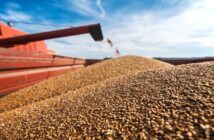Despite the pressure of Russian exports, UK feed wheat futures have held on to the gains made earlier in the week. The current AHDB Grain Market Report sees UK feed wheat futures (May-24) at £165.40/t yesterday, 14th March. New crop futures (Nov-24) were also up on the previous week by over £7.00/t, ending at £185.70/t.
Russian wheat has continued to flood the market as the country attempts to reduce its inventories in preparation for a bumper 2024 harvest. It has weighed down slightly on both U.S. and European prices, although so far it hasn’t pulled prices down to the lows seen the previous week.
Cheap Russian grain has prompted China to cancel the purchase of over 500 Kt of U.S. soft red winter wheat, the largest reported cancellation in over two decades (UkrAgroConsult). At the start of the month, senior analyst Helen described the short-term outlook as ‘bearish’.
Rapeseed fortunes varied. Paris rapeseed futures (May-24) fluctuated over the week but currently stand at €440.25/t, well above the close of the week before. New crop futures (Nov-24) were largely unchanged over the same period, standing at €442.00/t.
However, further fluctuations are likely. Despite a drought during the growing season, Australia’s rapeseed crop appears to have turned a corner, with late-season rain benefitting yield estimates. LSEG now estimates total Australian rapeseed production for 2023/24 at 5.31 Mt, up 7% on the previous estimate, adding some bearish sentiment to prices.
In contrast, old crop US soyabean markets were generally supported yesterday. Intense rainfall in Argentina could lead to losses to the country’s soyabean crop. Brazil has also seen adverse weather conditions this week, with Conab making a 2.6 Mt cut to its Brazilian soyabean production estimate, now at 146.9 Mt.
Statistics Canada estimated that farmers will plant 8.7 Mha of canola for harvest 2024, down 3% from last year. This is possibly in response to the general downturn in rapeseed/canola prices. This Canadian crop will be crucial for determining rapeseed premium to soyabeans at the end of 2024.




